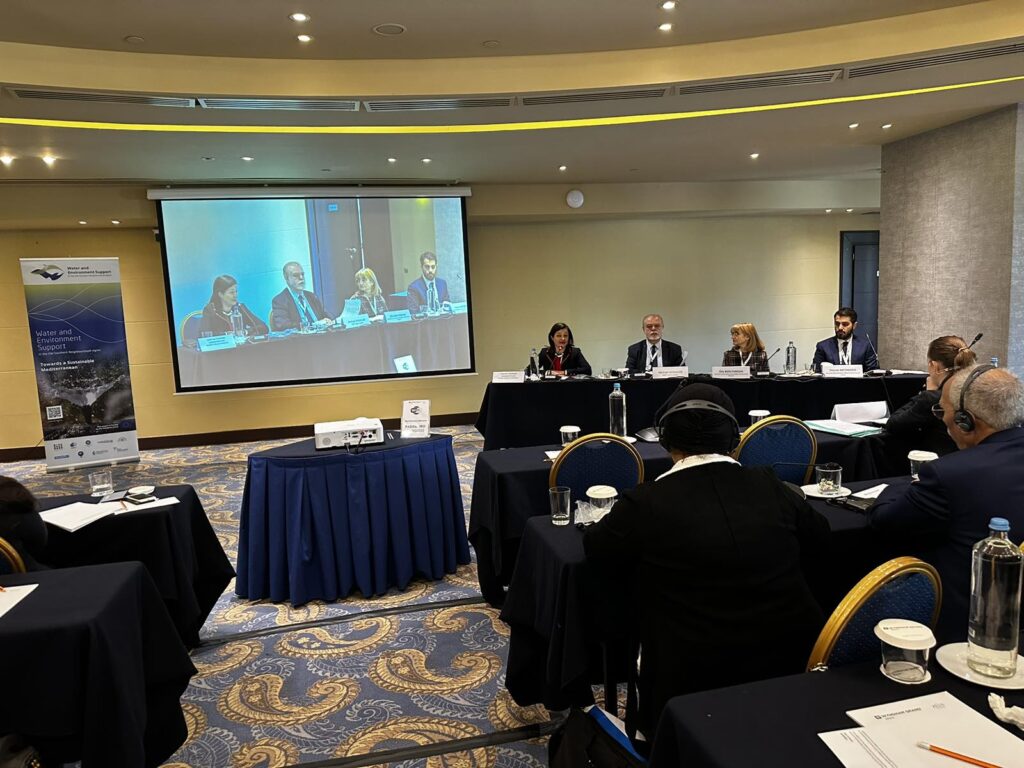A first ever Regional Training dedicated to the Promotion of the Aarhus Convention in the whole of the Mediterranean was co-organized by the EU funded “Water and Environment Support (WES) in the ENI Neighbourhood South Region” project and the UNECE Aarhus Convention Secretariat, in Athens, Greece, on the 14th and 15th of November 2023.

The panelists from Left to right: Dr. Dionysia-Theodora Avgerinopoulou, Member of the Hellenic Parliament, Chair of the Parliamentary Committee on Environmental Protection, Prof. Michael Scoullos, Chairperson of MIO-ECSDE and WES Team Leader, Ms Ella Behlyarova, Secretary to the Aarhus Convention, Environment Division, United Nations Economic Commission for Europe (UNECE), Mr. Stavros Antoniadis, Associate Administrative Officer/Environmental Lawyer, UN Environment Programme / Mediterranean Action Plan Coordinating Unit
The main purpose of this 2-day regional training, that is part of an ongoing WES Peer-to-Peer process (since February 2023), was to strengthen the implementation capacity of public authorities, country experts, NGOs and other stakeholders on the main pillars of the Aarhus Convention: access to information, public participation in decision-making and access to Justice, as well as on the application of the principles of the Aarhus Convention in international decision-making.
During her opening remarks, Ms Ella Behlyarova, Secretary to the Aarhus Convention, Environment Division, United Nations Economic Commission for Europe (UNECE), underlined “I am convinced that the accession to the Aarhus Convention and its Protocol will drive the development of national legislation and practice, bringing positive changes that would otherwise not occur. Being a Party to such agreements will help to respond to numerous environmental challenges such as climate change, loss of biodiversity, air and water pollution, and ensure implementation of Agenda 2030, in particular its Goal 16, to the common standards. The secretariat stands ready to support the interested States from the Mediterranean region to effectively prepare for the accession.”
The WES Team Leader, Prof. Michael Scoullos, expressed gratification and enthusiasm that the WES Partner Countries have shown concrete commitment and are making a genuine effort to embrace this challenging yet highly beneficial instrument – so crucial in achieving sustainable development in the Mediterranean region. He emphasised that “The major global crises (environment, climate change, biodiversity) cannot be addressed by Governments alone, even if the political will may be there. For policies to be effective, commitment of social groups and individuals are necessary. The needed consensus cannot be obtained without meaningful public participation, transparent and adequate environmental information and, when needed, access to justice; all of which are enshrined in the Aarhus Convention”.
The 18 appointed high-ranking Peers from Ministries of Environment, Water, Foreign Affairs, Justice, etc. that came to Athens were very engaged in the discussions that followed the presentations and interactive exercises on the provisions of the Convention, its principles and practical implementation. Diverse experiences of the Parties to the Aarhus Convention were also shared and discussed.
Ms Chloe Galea, Senior Officer in Legal Affairs of the Environment and Resources Authority of Malta, described how the Convention’s pillar on access to information is implemented in her country. Public participation in decision making on urban development/cities was the focus of Ms Suada Numic’s presentation, Head of Department in the Sector for Environmental Permits, Federal Ministry for Environment and Tourism of Bosnia and Herzegovina. Ms Maja Raicevic, Senior Advisor at the Ministry of Ecology, Spatial Planning and Urbanism of Montenegro outlined how access to justice in information-related cases is applied in the country, while the experience of Cyprus in hosting the 9th “Environment for Europe” Ministerial Conference that took place in Nicosia in October 2022 was showcased by Ms Eirini Konstantinou, Head of European and International Affairs, Department of Environment, Ministry of Agriculture, Rural Development and Environment of Cyprus.
In its efforts to promote Environmental Governance in the Mediterranean by encouraging the accession to and implementation of the Aarhus Convention, MIO-ECSDE and the WES project have joined forces not only with the UNECE Aarhus Convention Secretariat, but also the Barcelona Convention system, the Union for the Mediterranean (UfM), the Circle of Mediterranean Parliamentarians for Sustainable Development (COMPSUD), the Energy, Environment and Water Committee of the Parliamentary Assembly of the Union for the Mediterranean (PA-UfM) and the MEPIELAN Centre, all of whom had the opportunity to share their experiences and plans. Collectively, a Mediterranean Accession Agenda to the Aarhus Convention has been agreed to guide the region in a harmonised way.
The UNECE Convention on Access to Information, Public Participation in Decision-making and Access to Justice in Environmental Matters was adopted on the 25th June 1998 in the Danish city of Aarhus at the Fourth Ministerial Conference in the ‘Environment for Europe’ process. Together with its Protocol on Pollutant Release and Transfer Registers (PRTR), it protects every person’s right to live in an environment adequate for his or her health and well-being. They are the only legally binding instruments open for accession to all UN Member States that promote effective participatory governance, putting Principle 10 of the Rio Declaration on Environment and Development in practice.
Useful documents of the activity can be accessed via:
https://www.wes-med.eu/activities_type/he-4-p2p-overall-environmental-governance-promotion-of-the-aarhus-convention-in-the-whole-of-the-mediterranean/
https://unece.org/environment-policy/public-participation/aarhus-convention/introduction
Read in French here